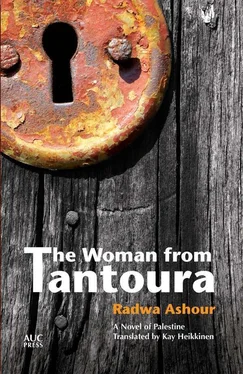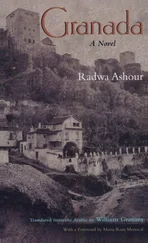They drove us to the beach and divided us into two groups, the men on one side and the women and children and some old men on the other. It was the first time I saw female soldiers: women wearing a military uniform and bearing arms. They spoke to us in Arabic and began to search us, one after the other, taking any money or jewelry they found on us and putting it in a helmet. Every time the helmet was filled they emptied it onto a large blanket stretched out on the sand. The woman soldier didn’t notice the goat but she noticed the rings in my ears as she was searching me. She yanked them out, and blood flowed from my ears. I wiped them with the edge of my dress. The soldier moved on to search my mother and Wisal and Abed and his mother. They took the cans of oil and olives and the half measure of cheese. My mother was stripped of her ring and her earrings and the chain she wore around her neck. We were standing close together. I looked at my mother’s face and saw her lips moving slightly, continuously, and I didn’t know if she was mumbling prayers or repeating verses from the Quran or trembling. I whispered in Wisal’s ear, “Was this the way they took over your town?” She said, “No, they didn’t stand us by the sea. They took us out of our houses to the bus, but they took the women’s jewelry and any money they found on them.”
I was standing at the edge of the group nearest the men. My eyes couldn’t stop looking, hoping for the sight of my father or either of my brothers. I did not see them; I surmised that they had taken off for the mountains or had disappeared into one of the caves. I saw the “burlap bag”: a man standing next to the Jewish soldiers with his head covered by a burlap bag that had two holes in it so he could see. The officer was examining a paper in his hand and would call the men’s names, and the man would answer or not. If he didn’t answer the “burlap bag” would step forward and point him out; sometimes he would point without any call. No sooner did the “burlap bag” point to someone than they brought him out. They would take a group of men, five or six or seven, and disappear. Were they taking them to the prison in Zikhron Yaakov? We heard the rattle of bullets fired — was the guard resisting? I took Wisal’s hand and she looked at me, as if asking why I was squeezing her hand; she did not ask. The goat came close to me and began touching my feet, but I did not pick her up. Abed said he was thirsty, and his mother told him to put up with it. I said to the soldier, “The boy’s thirsty,” and she answered me with a foul word, pushing my shoulder with the butt of her rifle. The weather was hot and the sun burning, and I wondered why my mother had asked me to put on three dresses, and why I obeyed her. I was dripping with sweat; I wanted to ask her, but I did not. The soldiers shouted loudly, “Yalla, let’s go!”
The procession of women began to move. They led us toward the cemetery. On the way I saw three corpses and then two more, none of which I recognized.
As they were leading us toward the cemetery I noticed that the village had a strange odor, mixed with the scent of the white lilies that grew on the islands and along their beaches at that time of year. I couldn’t distinguish the odor even though it remained in my nose after we left the village. Afterward it would sometimes appear suddenly, days or weeks later, without my knowing where it had come from or why the village had had that odor on that particular day.
At the cemetery two trucks were waiting. Threatening us with their weapons, they told us to get in. One of the soldiers took the goat from me as I was carrying it. We were several hundred women, children and old men, maybe five or six hundred. They crammed us into the trucks, and they began to move. Suddenly I shouted and pulled my mother’s arm, pointing with my hand to a pile of corpses. She looked where I was pointing and shouted, “Jamil, my cousin Jamil!” But I pulled her arm again with my left hand and pointed with the right to where my father and brothers were: their corpses were next to Jamil’s, piled one next to the other at a distance of a few meters from us. I was pointing and my mother was still keening in mourning for Jamil with his mother. The women were wailing and the children were crying, terrified of their mothers’ weeping, while the old men stayed stiff as statues.
The trucks left us at al-Furaydis, at a distance of four kilometers from our village, where we were handed over to the headman, our number was written on the papers, and then we were distributed among the people’s houses. I did not say to Wisal that we had become refugees like them. I didn’t say anything during the entire time we stayed in al-Furaydis. My mother was sure that I had lost the power of speech. She kept saying, “Her father and her brothers will be worried sick when they find out that she has lost the ability to speak.”
In al-Furaydis and on the road to the Triangle, and in Tulkarm and Hebron and on the road to Sidon, and during all the years she lived in Sidon, my mother would repeat ceaselessly, never tiring, that her boys had fled to Egypt and that Abu Sadiq had been arrested with the men of the town, that we didn’t know if he had been released without knowing where we were or if he was still among the prisoners. One of the women whispered that Umm Sadiq had lost her mind. Another answered, “It’s really strange, she’s completely rational outside of the subject of her husband and her boys.” The first replied, “By the Lord of the throne, I didn’t believe my own eyes, I said that a mother’s heart knows best and maybe we were mistaken. But one of the young men they took to dig the mass grave saw that Abu Sadiq and his boys were among the corpses they buried.”
My mother would say, “Thank God that Sadiq and Hasan fled to Egypt. When things calm down they will come back safely.” In Sidon a year after we left she implored my uncle to travel to Egypt to let them know that we were living in Sidon. “Poor things, they must be heartsick with worry about us, and here we are, living safe and sound.”
After we arrived in al-Furaydis some of the boys began to work in Zikhron Yaakov for a few piasters, bringing them back to their mothers at the end of the day so they could buy bread. Sometimes the Jewish boys from the settlement would harass them, beating them and taking the money, and they would come back without it the same way they left. They took other boys and some of the young men of al-Furaydis to our town to harvest the crops. A woman in al-Furaydis shouted, “Good God, we’re hungry and the stalks on our land are two feet high!” She said to her sister, “Come with me,” and she went to the town to harvest some of the wheat. In the evening her sister returned with her dress ripped and clear marks from blows on her face. She asked some of the young men of al-Furaydis to help her bring back her sister’s body; she had been caught unawares by a military vehicle. She said, “They ran her over on purpose, and when I tried to get close to see what had happened to her the car came back toward me and I jumped away. The car ran over her a second time.”
We stayed four weeks in al-Furaydis, hosted by the people of the town. They put down beds and divided their provisions, but it was meager; some of the old died. As for the nursing infants, they fell incomprehensibly — every day an infant would die, and sometimes two. We buried twenty-five children in al-Furaydis or maybe thirty, as well as the woman who was run over by the military car and the old people who died. Then the Red Cross took charge of us, and they took us east to a leveled wasteland in the Triangle area, where Jordanian officers took charge, counting us and signing for the delivery. Then they took us to Tulkarm in buses. They deposited us in a school near the Hijaz railway line. In Tulkarm we were shelled by Israeli planes, and the son and daughter of Yahya al-Ashmawi were martyred. Two weeks later other buses came and took us to Deir al-Maskubiya in Hebron. Every Friday the people of Hebron would butcher lambs, grill them, and bring them to us with rice, bringing enough for everybody. Many children died, perhaps not so much from hunger as from cold, or perhaps because of their mothers’ grief. Wisal and I went back to wearing our three dresses, one on top of the other. Wisal talked a lot and I would listen to what she said, but I did not talk. Now I don’t know if I had lost the ability to speak or if I didn’t want to talk. My mother says that from the time we left the town until we arrived in Sidon, I did not utter a single word. Abed stayed with me like my shadow, and he would not sleep anywhere but beside me. I would warm his hands and feet and keep patting his head until he slept. But I didn’t sing to him the way I used to when we were back home, for I didn’t have a voice.
Читать дальше












